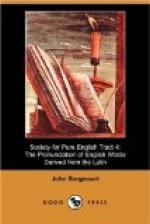’It would be worth while to distinguish flower and flour (which originally, like metal and mettle, were the same word); yet in practice it is not easy to make the difference audible. The homophony is sometimes inconvenient.’
CORRECTION TO TRACT II
On p. 37 of TRACT II the words ’the Anglo-prussian society which Mr. Jones represents’ have given offence and appear to be inaccurate. The German title of the series in which Jones’s Dictionary is one has the following arrangement of words facing the English title:
HERAUSGEGEBEN
UND
DER “ASSOCIATION PHON[’E]TIQUE INTERNATIONALE” GEWIDMET
VON
H. MICHAELIS,
and this misled me. I am assured that, though the dictionary may be rightly described as Anglo-Prussian, the Phonetic Association is Gallo-Scandinavian. In behalf of the S.P.E. I apologize to the A. Ph. I. for my mistake which has led one of its eminent associates to accuse me of bearing illwill towards the Germans. The logic of that reproach baffles me utterly.
[R.B.]
* * * * *
SOME LEXICAL MATTERS
FAST = QUICK OR FIRM
‘An Old Cricketer’ writes:
’After reading your remarks on the ambiguity of the word fast (Tract III, p. 12) I read in the report of a Lancashire cricket match that Makepeace was the only batsman who was fast-footed. But for the context and my knowledge of the game I should have concluded that Makepeace kept his feet immovably on the crease; but the very opposite was intended. At school we used to translate [Greek: podas [^o]kus Achilleus] “swift-footed Achilles”, and I took that to mean that Achilles was a sprinter. I suppose quick-footed would be the epithet for Makepeace.’
SPRINTER is a good word, though Sprinting Achilles could not be recommended.
BRATTLE
A correspondent from Newcastle writes advocating the recognition of the word brattle as descriptive of thunder. It is a good old echo-word used by Dunbar and Douglas and Burns and by modern English writers. It is familiar through the first stanza of Burns’s poem ’To a Mouse’.
Wee sleekit cow’rin tim’rous
beastie,
O what a panic’s in thy breastie.
Thou need na start awa sae hasty
Wi’ bickering
brattle....
which is not suggestive of thunder. The N.E.D. explains this as ’to run with brattling feet, to scamper’.
In Burns’s ‘A Winter Night’, it is the noisy confusion of biting Boreas in the bare trees and bushes:
I thought me on the ourie cattle
Or silly sheep, wha bide this brattle
O’
winter war.




